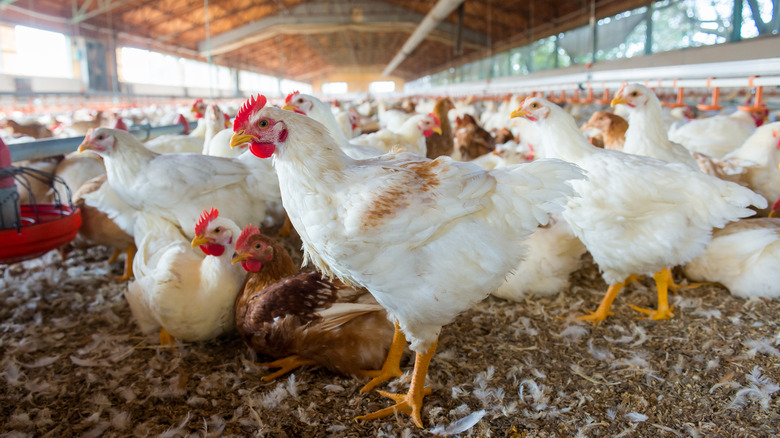The Real Reason This Iowa Egg Facility Just Had To Kill Millions Of Chickens
On Saturday, April 23, the Minneapolis Timberwolves were playing the Memphis Grizzlies. The game had entered the third quarter when, as USA Today reports, a woman ran onto the court wearing a uniform with the number 5.3. She was quickly taken away by security, but a point was made.
This number refers to the 5.3 million chickens that were recently slaughtered by Rembrandt Enterprises, a chicken farm for which the owner of Minneapolis Timberwolves Glen Taylor serves as a director. Essentially, a bird flu outbreak occurred amongst the chickens in March, meaning that the U.S. Department of Agriculture wanted them killed as quickly as possible for the sake of public health. This isn't the first time a corporate chicken farm has made headlines, either. Costco's enormous chicken farm changed Nebraska in big ways, per Civil Eats.
According to the Storm Lake Times Pilot, the method used for the chickens' eradication was the shutting off of the farm's ventilation system. The facility then raised the interior temperature to 104 degrees Fahrenheit until all of the birds suffocated. Or, as one protestor described to CBS, "They were essentially roasted alive. They were cooked from the inside out." This, the protestor thought, was one of the cruelest ways to have contained the contagion. "I don't think any farm should have that many birds to begin with," they added.
Rembrandt Enterprises then fired its workers
A lesser mentioned part of the story is that, after disposing of the suffocated chicken corpses, the farms' employees were then fired as well.
"We get [why so much outrage was inspired by the chicken culling]: it was really inhumane the way they killed them," a former plant supervisor said to The Guardian. Then came the inevitable "but." Namely, the workers were the ones who, for days, trudged through mounds of corpses and excrement to properly dispose of the diseased bodies. With all the chickens gone, however, the farm didn't need the workers to take care of the birds.
More gallingly for the supervisor, though, was the fact that the company required neither mask-wearing nor vaccination of its workers. "They actually liked the fact that we didn't require our employees to get vaccinated," he added, "because they were hoping we would get employees from the surrounding areas that were requiring their employees to get vaccinated." This was despite the fact that COVID-19 cases were surging on the farm.
While not as dramatic, the cavalier attitude towards the health of these workers echoes when managers of the chicken processing giant Tyson were making bets about how many workers would catch the coronavirus (via VegNews). This disregard toward workers does not tend to receive the same public protest as animal rights, but their treatment by Rembrandt Enterprises shows how little has changed even after the pandemic has changed workplace attitudes and relationships. After all, if restaurant owners are still concerned about COVID, it may be a hint that other industry professionals should be, too.

